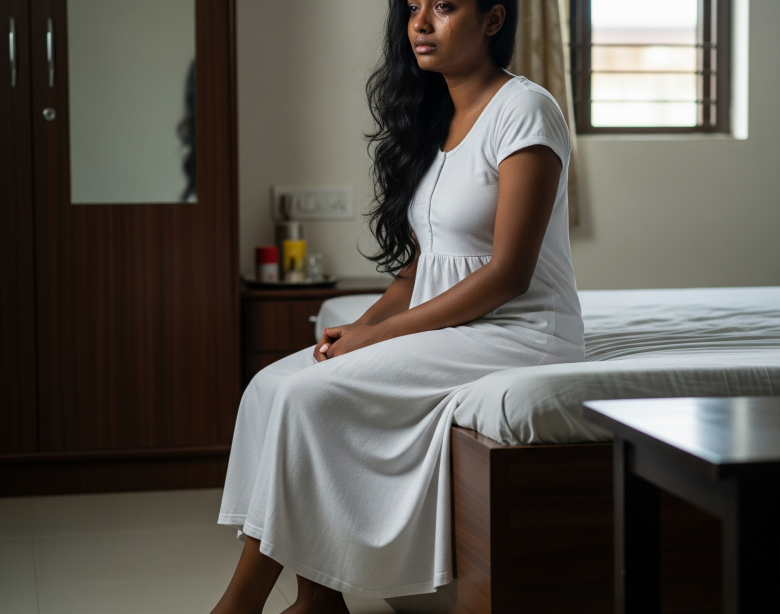Chapter 1 — The Journey South
Irulan sat on the edge of his bed, eyes blank, ignoring the crumpled mark sheet that lay by his feet. The red ink screaming “FAIL” in three subjects seemed to have burned into his soul. His father’s voice, shrill and bitter, still echoed in his ears:
“Nee enna panra? Thirundave maatiya! Pasanga ellam engineering seat vaangithu poranga, nee enna da panra?”
He could handle the scolding. What he couldn’t bear was the look in his mother’s eyes—silent, resigned, tired.
Later that night, as the house lay heavy in silence, his mother came into his room. She didn’t say a word. She simply pressed a few folded hundred-rupee notes into his palm and whispered, “Po da, Madurai poyittu vaa. Konjam manasukku calma irrukkum. Ammama kita irundhu discipline kathukkalam.”
She hesitated, eyes shimmering. “At least andha veetla safety irukkum.”
Irulan didn’t argue. The next morning, before the sun rose, he slipped out of the house with a small duffel bag and boarded a bus to Madurai. The hot diesel-smelling air, the rattling windows, and the constant hum of Tamil film songs over the speakers didn’t faze him. He was numb. Aimless.
When he reached Madurai, the air was thick and dry. Crows screamed in the sky. His grandmother’s house stood near the edge of the city, in an old neighborhood of tiled roofs and dusty bougainvillea hedges. It smelled like turmeric and gingelly oil.
His grandmother, Ponnamma, opened the door in a faded saree and raised one eyebrow.
“You look thin,” she said flatly. “And dark as coal. Eat some ragi and sleep. Don’t think I’ll tolerate nonsense here.”
Her daughter, Aunt Jayanthi, barely looked up from the kolam she was drawing. “Kudichittu vandha maari irukkaan,” she muttered.
His cousin Rohini, visibly pregnant and glowing with irritation, stared at him from the sitting mat. “No job, no college, just roaming?”
Irulan rolled his eyes and went in.
He had hoped that Madurai would be a break. But slowly, the same patterns emerged. He hung around roadside tea stalls, borrowed money and didn’t return it, leered at college girls passing by, whistled vulgar lyrics under his breath, and started sneaking cigarettes at night. When his grandmother caught him smirking at Rohini’s changing figure drunk, it was the last straw.
That evening, the women sat on the back verandah. Rohini rubbed her swollen belly with both hands and sighed.
“He’s not just lazy,” she said. “He looks at women like…like we’re objects. I’m pregnant and still uncomfortable around him.”
Jayanthi shook her head. “His father has no patience, his mother is too soft. He needs reform. Real reform.”
Ponnamma’s face was stern and unreadable. Then she rose, slowly, and disappeared into her room. She returned a moment later carrying a small palm-leaf bundle tied with sacred thread.
“Amma!” Jayanthi whispered, eyes widening. “That’s the Oolai Chuvadi, right? The forbidden one?”
Ponnamma nodded. “This is not just a boy misbehaving. He’s on his way to becoming a man who ruins lives. Men like this—arrogant, entitled, blind to the world of women—need to see things from the other side.”
“You can’t,” Rohini said, suddenly nervous. “Changing him into a girl? That’s permanent!”
Ponnamma’s voice was steel. “If he learns, the change can be reversed. If not, then let him live as the kind of woman he disrespects.”
That night, Irulan’s mother called from Chennai. Her voice was shaking.
“Please, Amma…don’t do it. He’s my son. I know he’s gone off track, but this…this is cruel.”
“He needs to be taught,” Ponnamma said simply. “And women have been patient for too long.”
That night, as the cicadas screamed and dogs barked in the distance, Ponnamma opened the Oolai Chuvadi. The palm leaves passed on through generations of women in the family fluttered with ancient power. Her lips chanted softly in rhythm with her fingers. The shadows around the house thickened. Irulan slept soundly in the back room, unaware of the storm quietly forming inside him.
By morning, Irulan would no longer be Irulan.
Chapter 2 — Becoming Nila
The first thing Irulan noticed was the weight. Not emotional—physical.
A heavy sensation pressed against his chest, his hips ached in a strange, deep way, and something felt undeniably off between his legs. He blinked in confusion, still half-asleep, as the morning light filtered through the wooden window slats.
When he sat up, the sensation of his shirt brushing against his chest startled him.
“What the hell…”
He pulled off the sheet and stared.
Two round, soft mounds now curved beneath his loose T-shirt—his nipples clearly visible, poking through the thin fabric. He gasped and touched his chest. His fingers trembled.

“No. No, no, no…”
He stumbled to the corner mirror—an old full-length frame with rusted edges—and froze.
His reflection was not his own.
Gone was the dark-skinned, lanky boy with sharp cheekbones and careless eyes. In his place stood a shorter, rounder, deeply feminine version—his skin darker still, glowing with a richness he had never appreciated before, framed by a mass of unruly black curls.
His waist dipped inward now. His hips flared. And behind him, as he twisted in shock, was a curvaceous, pronounced butt that swayed even as he shifted nervously.
“I’m… I’m a girl.”
His voice cracked—softer now, tinged with a high pitch he didn’t recognize. He backed away, shaking. Sweat trickled down his temples. Every part of him felt foreign. Heavy. Soft. Vulnerable.
When he tried to pee, he sat down instinctively—and then stared blankly for minutes afterward, trying to make sense of what just happened.
“This is disgusting. I can’t—this can’t be real.”
He locked the door and didn’t come out for two days.
Every time someone knocked—Rohini, Jayanthi, even Ponnamma once—he screamed back in rage.
“Leave me alone!”
“I don’t care what you witches did to me!”
“I’m NOT wearing those clothes!”
A bundle of sarees and salwars had been left at his door. He didn’t touch them. He stayed in his oversized shirt and a towel, pinned at his waist. But it barely clung to his new curves.
The worst part?
He cried.
He didn’t know why. It started slowly. A sniffle. A welling in the throat. Then full-blown sobs that racked his—her—chest. Her shoulders shook uncontrollably.
“I’m crying like a bloody girl,” she muttered in disgust, pounding the floor with her fists. “What is this curse?”
On the third day, the door creaked open.
Rohini stood there, a plate of idlis in hand, belly visibly larger, eyes calm. “You need to eat.”
“Go away,” she snapped. “This is your fault. All of you!”
“I’m just trying to help, Irulan.”
“Don’t call me that,” she hissed.
Rohini placed the plate down gently. “Then what should I call you? You’re not him anymore.”
“I didn’t ask for this!” Her voice cracked. “You all hated me so much that you turned me into this—this curvy joke!”
“You were hateful,” Rohini said softly. “To women. To your mother. To your classmates. To me. You didn’t see us as people. Just bodies.”
Silence.
“Now you know what it feels like… to be stared at. Touched by clothes that don’t fit right. Judged. Small. Weak.”
She turned to go. “You can either scream forever or… learn to live.”
That night, Irulan didn’t sleep. She kept staring at her reflection, tracing the outline of her waist, the slope of her hips, the jut of her chest. She hated all of it. But she couldn’t stop looking.
The next morning, when Rohini knocked again, she didn’t yell. She opened the door a crack.
“Why are you being nice to me?” she asked flatly.
“Because,” Rohini said, smiling gently, “I know you’re scared. And because you’re my cousin, girl or boy.”
Irulan hesitated.
“You… you really think I’m a girl now?”
Rohini reached out and touched her chin. “You are. At least for now.”
“I feel like I’m trapped. Like there’s no me left.”
“You’re still here. Just… different.” She paused. “Do you want a name?”
Irulan’s lip curled. “Why would I need—?”
“I thought of one,” Rohini continued. “Nila. Shining bright in the Irul of the night. Strong, but beautiful. Just like you now.”
Irulan didn’t answer. But the next time she cried, it was into Rohini’s shoulder.
Chapter 3 — The Shape of Her
Nila stood at the doorway of the kitchen, arms folded tightly across her chest.
Jayanthi looked up from where she was chopping drumsticks and said flatly, “You’ve worn that same shirt for five days. You smell like sweat and shame.”
“I didn’t ask for this body,” Nila muttered. “I’m not going to prance around in girl’s clothes like it’s Deepavali.”
Ponnamma, sitting cross-legged on the stone floor, rolling out murukku batter, didn’t even look up. “Then starve. No churidhar, no lunch. Simple.”
“I’m still me! Irulan!”
Jayanthi pointed the knife toward her. “Irulan had his chance. And he blew it.”
Rohini stepped in with a bowl of tamarind water. “Please. Let her eat, at least.”
Ponnamma said nothing. She picked up the Oolai Chuvadi, which lay near the brass lamp, and held it lightly in one palm. “Do you know how dangerous this magic is, child?” she said quietly. “This is no cartoon transformation. It’s a blessing and a curse.”
Nila flinched. “Then take it back.”
“You haven’t earned that yet.”
Jayanthi handed her a folded salwar kameez and a packet of pink panties. “Wear this. And for god’s sake, bathe. Your cousin already showed you how to wash… properly.”
Nila glared. “What’s next? Eyeliner? Nose ring?”
“If that’s what it takes,” Ponnamma replied, unfazed.
After her bath, Nila reluctantly slid into the panties. They hugged her skin like nothing she’d worn before. Soft. Delicate. Her round butt stretched the elastic, and she cursed under her breath at the new way she had to sit, stand, walk. She hated how her hips moved, how every motion was like a dance she didn’t ask to learn.
The churidar was tighter than expected. Her breasts shifted inside the kameez as she moved, rubbing against the thin fabric. She felt them all the time. There was no ignoring them.
When she tried climbing the stairs to the terrace, she stopped halfway, panting.
“What the hell,” she muttered. “Am I… weaker?”
Jayanthi stood at the top, arms folded. “Welcome to womanhood, dear. You’ve lost your upper body strength. Your centre of gravity’s different. And you carry more fat in your thighs and hips. That soft sway in your step? That’s natural now. You can’t walk like a boy anymore.”
Nila flushed. “I feel like I’m wearing someone else’s body.”
“You are,” Jayanthi said. “Now put on the damn bra.”
“No.”
That evening, at dinner, Nila kept her arms folded. Her breasts bounced slightly every time she reached for rasam, and it made her squirm.
Rohini leaned close. “You’re going to hurt your back if you keep refusing.”
Jayanthi smirked. “Let her wobble. Maybe then she’ll learn humility.”
Ponnamma silently placed a plain cotton bra on Nila’s plate like it was a sacred offering.
“I don’t want this,” Nila said, voice cracking.
“You don’t have to want it,” Ponnamma said. “You just have to wear it.”
Later that night, under Rohini’s guidance, Nila stood in front of the mirror, clumsily hooking the bra. The straps cut slightly into her shoulders at first. But the relief… the relief of being held, supported—it startled her.

She said nothing.
The next morning, she went to the kitchen wearing it under her kurta.
Ponnamma raised one eyebrow, but said nothing.
Jayanthi smirked. “See? Even proud little Irulan prefers some support.”
That week, Nila discovered dozens of things she hated.
The curve of her waist that made clothes fall differently.
The way her arms lacked strength to twist open a bottle.
How the breeze lifted the hem of her kameez just enough to expose her leggings-clad backside when she wasn’t careful.
How the sound of her own voice—softer, more lyrical—sounded feminine, and how it made men turn their heads in the market.
But worst of all was her body’s rhythm.
She was slower. Graceful, yes. But deliberate. Emotional. Vulnerable.
One night, during a power cut, Nila sat on the floor beside Rohini and whispered, “Am I… vanishing?”
“You’re still you,” Rohini said, braiding her cousin’s soft, thick hair. “Just… seen from another side.”
“Do you really think I’ll make it the full year?”
“That’s up to you, Nila.”
The name still felt foreign. But not as much as before.
Ponnamma, watching quietly from the threshold, whispered to herself, “Let the next moon judge her heart.”
Chapter 4 — The First Blood
Nila woke to a deep ache low in her belly. A dull, persistent twisting. She groaned and curled into a ball.
Something felt… wet.
She got up slowly, her legs trembling, and looked down. A red blotch stained the seat of her leggings. Her breath caught.
“No… no no no no…”
She pulled off the leggings with shaking fingers and stared at the blood-soaked panties. Her hands, now soft and small, trembled as she held the evidence of a truth she could no longer deny.
It had begun.
She didn’t go to the kitchen. She sat on the bathroom floor, locked in silence, numb.
Ponnamma was the one who knocked.
“Open the door.”
“Go away.”
“You’re bleeding, aren’t you?”
A long pause. Nila finally whispered, “Yes.”
“You’ll need a pad. And a clean towel. And turmeric water. Open. Now.”
Inside, Ponnamma moved like a ritual—efficient and gentle. She didn’t flinch. She didn’t mock.
“You’ll go through this every month now. Sometimes for five days. Sometimes longer. You’ll cramp. You’ll cry. You’ll feel angry for no reason. But you’ll still have to cook. Work. Smile.”
Nila watched, stunned, as her grandmother showed her how to place the pad in her panties and how to clean the blood from the inner thighs.
“This is the price you pay to create life. And you’ll pay it twelve times before the spell might lift.”
Nila looked up, eyes burning. “Might?”
Ponnamma nodded solemnly. Then she finally told her everything.
The Terms of the Curse:
- The transformation will last for twelve full menstrual cycles, marked by the bleeding of the womb.
- After the twelfth cycle, Nila must pass through a full moon night without betraying what she has learned—without resentment or bitterness in her heart.
- If she learns empathy, respect, humility, and womanhood not just in form but in spirit, the transformation will become reversible.
- But if she gets pregnant at any point, even by accident, the curse becomes permanent.
- If she tries to end her own life or abandon the experience, the magic will seal her fate as a woman forever.
- She must never reveal the magic to an outsider. If she does, it will backfire, and her future will belong to the will of the Oolai Chuvadi itself.
- Only Ponnamma can invoke the reversal—but only if the magic finds her worthy.
“Why would you make it this cruel?” Nila cried. “I was just a boy!”
“You were a boy who treated women like trash,” Jayanthi said from the doorway. “Like toys. Like weak things. So now you get to be the thing you mocked.”
Nila wiped her eyes with the back of her hand. “And if I don’t make it? What then?”
Ponnamma looked her straight in the eye.
“Then you will be Nila. Forever. With all the rights and struggles of a woman. And you’ll raise daughters to never meet boys like Irulan.”
Rohini came in later that afternoon with a hot water bag and a cup of ginger tea. She sat beside Nila on the bed and placed a hand on her stomach.
“Hurts, doesn’t it?”
“I can’t even sit straight,” Nila groaned.
“It gets better. Then worse. Then better again.”
Nila tried to smile. “This is disgusting.”
“You’ll survive it. We all do.”
She passed her a folded chart she’d drawn on notebook paper. Twelve boxes—each labeled “Cycle”—followed by a drawing of a full moon.
“This is how we’ll keep track,” she said. “You just passed the first test.”
That night, curled in bed, a pad nestled uncomfortably between her thighs and the dull pain still pulsing low in her abdomen, Nila stared at the moonlit ceiling and whispered to herself:
“One down. Eleven to go.”
She didn’t know who she’d be at the end of the journey.
But she was no longer sure she hated the name Nila.
Chapter 5 — Outside Eyes
Nila stood in front of the mirror, chewing her lip.
The salwar kameez Rohini picked out for her was a simple one—light blue with white trim. It was modest, airy. Comfortable, even. But the bra underneath tugged at her shoulders. Every few minutes, she reached to adjust the straps, annoyed by the way they dug into her soft skin.
“This thing is evil,” she muttered, shifting her chest.
From behind her, Rohini laughed. “Get used to it. It’s the harness of womanhood.”
“I swear, the only thing worse than bleeding is this torture device.”
“It’s not torture, Nila. It’s scaffolding. Keeps things… up.”
Nila looked down at her own chest. The bra did give her breasts a certain shape—round, lifted, contained. But she hated how aware it made her of them. She could feel the weight of each curve, how they moved when she walked. Without the bra, they swayed and bounced too much; with it, they were compressed, defined, made real.
Every time she crossed her arms, she was reminded of their presence.
Rohini tied her long hair into a braid and handed her a soft dupatta. “Come. You can’t stay locked in here forever.”
“I don’t want to go out.”
“You have to. Paati said you need to help with groceries.”
“What if someone looks at me?”
“They will.”
Nila froze.
“They will look,” Rohini repeated. “Because you’re beautiful. And because you’re a girl now. But you’re not here to flirt or please. You walk with your head high, Nila. Or they’ll think you don’t belong to yourself.”
The sun was harsh outside. Madurai’s dusty streets shimmered with heat. The scent of jasmine and petrol mixed in the air. Nila walked beside Rohini, her sandals slapping softly against the ground.
She felt every eye.
Men on bikes slowed. A group of college boys turned and whispered. One man leaned against a tea stall and gave a low, lingering whistle.
Nila shrunk inside her dupatta. Her steps faltered.
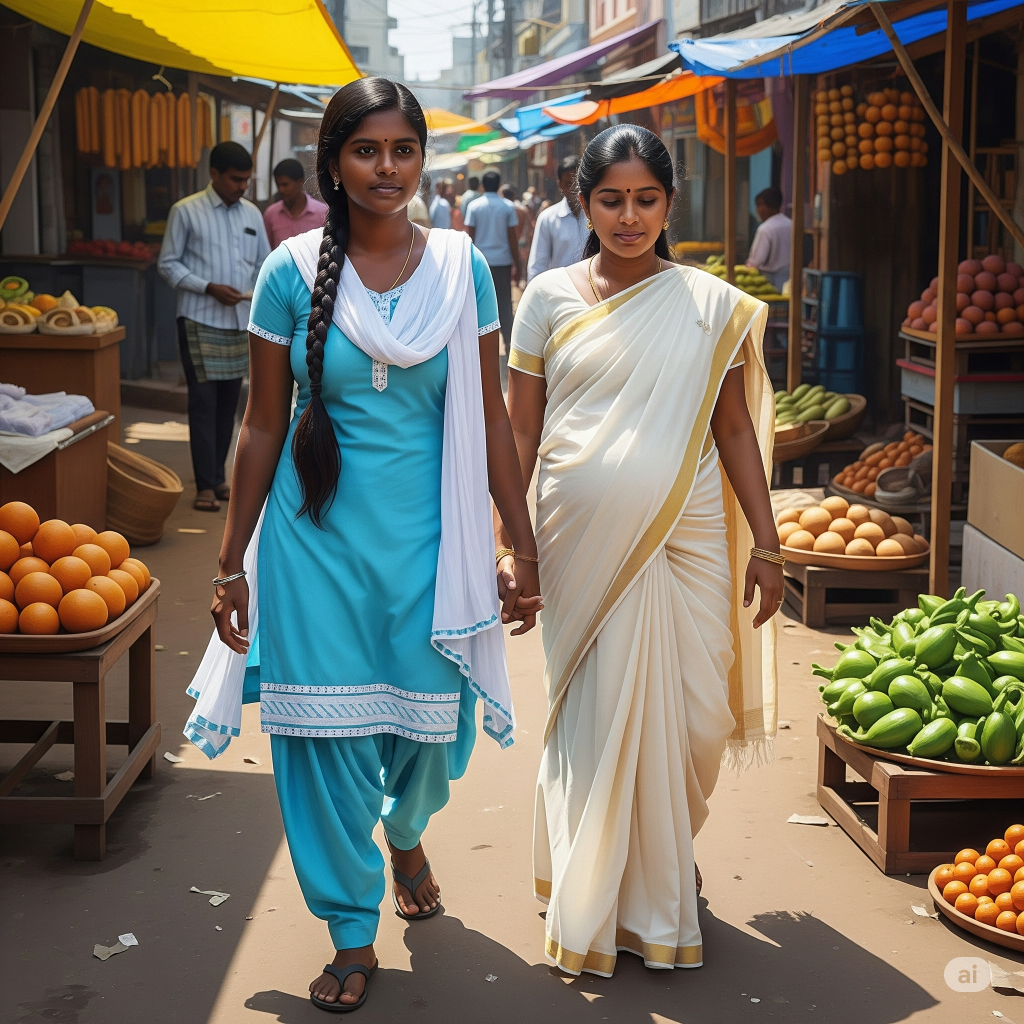
“They’re staring,” she hissed.
“They always stare,” Rohini replied calmly. “Now you know.”
Nila crossed her arms again, trying to hide the swell of her chest. But the bra pushed her breasts upward. Her kameez clung slightly to her stomach and waist, shaped now in soft curves she couldn’t flatten. Even the breeze felt invasive, sweeping the hem of her kameez against her thighs.
She hated it.
She hated how her body jiggled ever so slightly when she walked. She hated the way her bra pressed into her ribs when she bent to pick up vegetables. She hated the way the shopkeeper smiled at her—not kindly, but hungrily.
“I feel… open,” she whispered on the walk back. “Like I have no armor.”
“That’s how the world sees us,” Rohini said. “Every day. Now you see why we walk fast. Why we carry pins in our dupattas. Why we look down but keep listening.”
“I hate this.”
“You’re supposed to.”
Back home, Nila yanked off her dupatta and threw it on the floor. Then the bra. She winced as she unhooked it and scratched her shoulder where the strap had left a red line.
“I don’t care how necessary it is. It’s a cage.”
“But it’s a cage we’ve learned to live in,” Jayanthi said from the door. She was holding a fresh set of blouses. “Not because we like it. But because it keeps our dignity intact.”
Nila scowled. “Why should I have to wear it?”
“Because now you know what it means to carry weight on your chest—literally and figuratively.”
Ponnamma walked in just then, her sharp eyes scanning Nila’s flushed face.
“You went out?”
Nila nodded.
“Felt their eyes on you?”
Another nod.
“Then you’ve taken your first real step.”
She placed a small bottle of coconut oil on the table. “Oil your breasts before sleep. They’ll be sore. That means they’re growing. You may need a bigger size soon.”
Nila looked up in disbelief. “Are you serious?!”
“Very.”
That night, Nila lay on her side, her arm tucked under her curved waist, her breasts sore and soft under her loose cotton blouse. She touched the bra folded beside her pillow—still annoyed by it, still secretly grateful for it.
She thought about the men’s stares, the whistles, the shopkeeper’s hungry grin.
She thought about the twelve moons. The clock ticking. The rules.
One cycle down.
A long way to go.
Chapter 6 — Silk and Skin
It had been three weeks since Nila’s first period. Her days had settled into a routine: sweeping, folding, scrubbing, lifting. Her body ached by nightfall. Her breasts felt heavy all the time. The cotton bras dug painfully into her back. She often caught her reflection in the mirror and flinched — not at the unfamiliar softness, but at the fact that it was becoming familiar.
Ponnamma noticed too.
“You’re not a guest anymore, Nila,” her grandmother said one morning. “Time you looked like a girl of this house.”
“What does that mean?” Nila muttered.
“It means enough of nighties and salwars. Rohini has pressed a saree for you.”
“A saree?” Nila choked.
“Don’t act like it’s poison. It’s just cloth. Or are you still clinging to your sacred manhood?”
Rohini entered the room then, holding a pale turquoise saree with a thin golden border. It shimmered faintly in the morning light.
“It was mine when I turned sixteen,” Rohini said gently. “Soft cotton. Easy to wear. And it’ll suit your skin.”
Nila hesitated. “I don’t know how to tie it.”
Rohini smiled. “That’s why I’m here.”
Nila stood in her slip and blouse as Rohini gathered the pleats.
The petticoat hugged Nila’s new hips tightly, and the blouse — a simple back-buttoned one — pressed firmly against her breasts. The neckline felt low. Exposed. She shivered.
Then came the saree.
Rohini wrapped it once around Nila’s waist, snug against her skin, then began folding the pleats with the care of a priest preparing an offering. Nila stood still, her heart pounding.
When the pleats were tucked in, Rohini draped the pallu over Nila’s shoulder, adjusting it so it framed her chest just right. Nila looked at herself in the mirror.
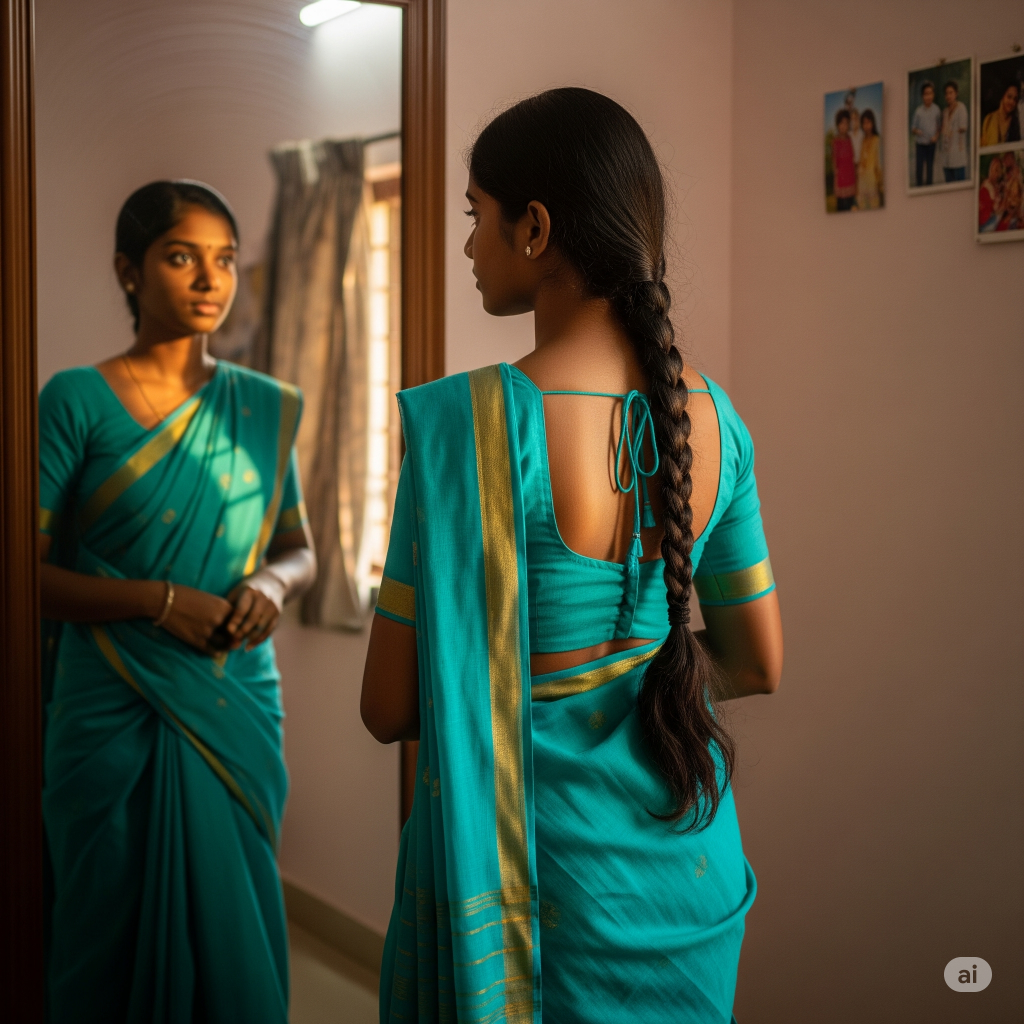
She gasped.
The woman looking back at her was… beautiful. Her waist looked impossibly narrow. Her hips wide. The pallu drew a lazy curve across her breast. Her thick, curly hair had been oiled and tied into a low bun. A hint of kajal lined her eyes, thanks to Rohini’s insistence.
“I look like… a bride,” she whispered.
“You look like yourself,” Rohini said. “Just… uncovered.”
Nila couldn’t speak. She sat down on the bed, legs shaking under the weight of the fabric and meaning.
That night, something stirred in her again.
Alone in her room, the saree folded neatly beside her, she bathed and changed into her nightie. But her mind kept returning to how the fabric had clung to her. How her breasts had swayed with every step. How her thighs had brushed softly under the pleats.
That ache returned. That want.
Tentatively, she slid her hand between her legs again, heart racing. This time, she didn’t hesitate. She let herself touch, let herself melt, let herself moan softly into the pillow as her body surged with warmth and sensation.
It was slower this time. Deeper.
Her hand learned the shape of her folds. The slickness of her arousal. Her breath grew ragged. Her thighs clenched.
When the orgasm came, it wasn’t sharp. It was tidal. Her whole body trembled, and she wept silently — from the pleasure, from the shame, from the surrender.
In the morning, as she sipped filter coffee by the window, Ponnamma walked past her and paused.
“You look less angry today,” she said.
Nila looked down, her voice quiet. “I wore the saree yesterday.”
Ponnamma just nodded. “And how did it feel?”
Nila hesitated.
“Like I was wearing someone else’s skin… but it fit better than mine.”
Chapter 7 – The Womb and the Mirror
The sun beat down heavy on Madurai, its heat radiating off the stone walls of the old house like a warning. The fan overhead whirred lazily, barely disturbing the thick air that clung to everything.
Nila sat on the floor mat beside her cousin Rohini, who reclined on a bolster pillow, her hand resting over the gentle swell of her six-month belly. The two of them had grown closer over the past few weeks, the ice between them slowly melting with every shared cup of rasam, every midnight whisper under the old ceiling fan. But today, Rohini winced as she tried to shift her weight, her ankles swollen and her eyes tired.
“Can you press here, ma?” Rohini asked softly, lifting her sari to reveal the curve of her calves.
Nila hesitated, still not used to the idea of being a ‘she’, still uncomfortable with the way her body moved, swayed, and felt. But something inside her—maybe guilt, maybe the unexpected warmth she’d begun to feel for Rohini—made her reach out and begin massaging gently.
Rohini exhaled with relief. “You’re getting good at this,” she smiled.
Nila smirked. “Maybe I’ll open a spa for pregnant women. Call it… Womb Service.”
Rohini laughed until her belly shook, and Nila couldn’t help but chuckle too.
Later that evening, Rohini sent her to the local store to get some fenugreek and jaggery. Dressed in a simple salwar, her hair oiled and braided, Nila still felt awkward in her body, her hips swaying too much, her breasts pulling at her chest with every step. But she had to admit—there was something oddly liberating about walking outside again.
As she paid for the items at the corner shop, a boy around her age lingered at the next counter. He was lean, with sharp features and a mischievous glint in his eyes. As she turned to leave, he stepped aside politely and offered a small smile.
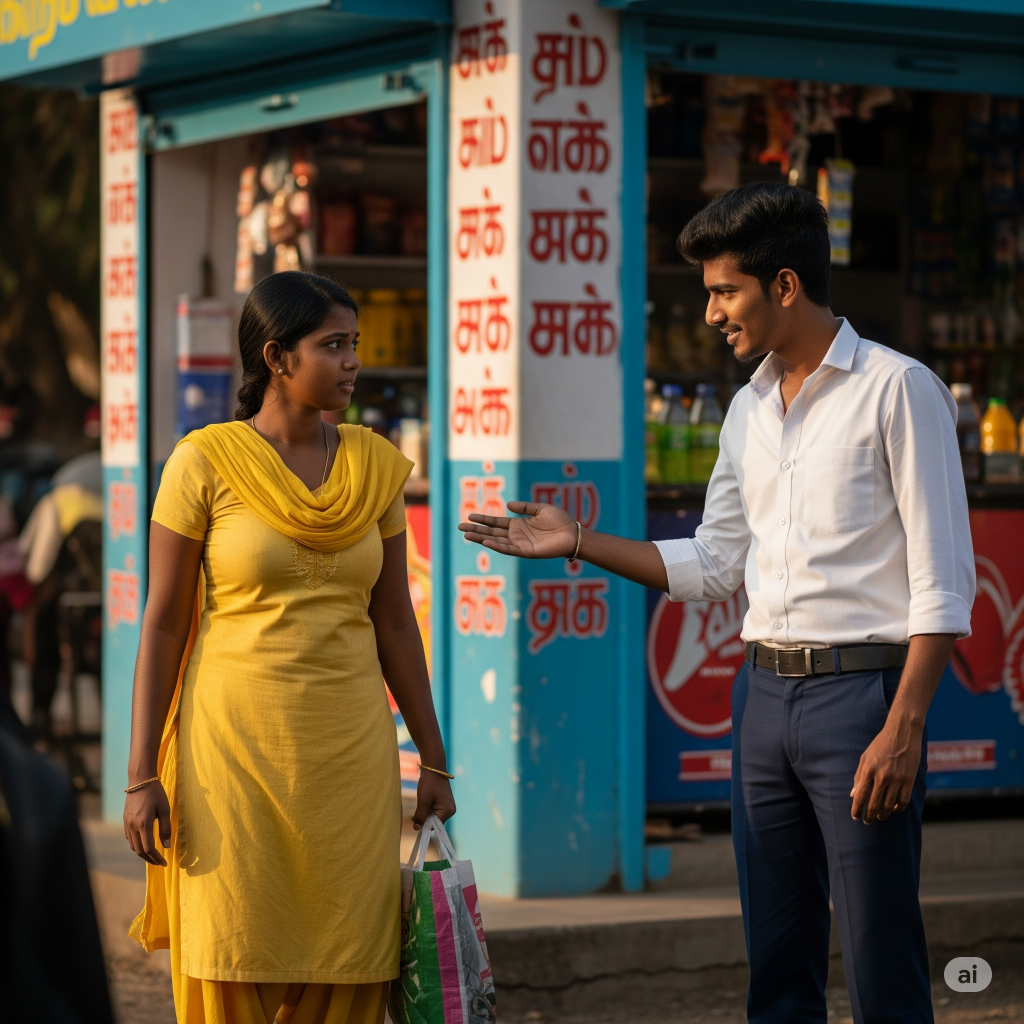
“You’re not from around here, are you?” he asked in Tamil.
Nila paused, startled. “Uh… no. Visiting relatives.”
“Figures. You walk like a city girl,” he said, eyes flicking—too obviously—over her frame.
Her pulse quickened. Was he flirting?
“You need help carrying that?” he added, eyeing the small cloth bag she held.
“No, thanks,” she said firmly, heart pounding, and turned on her heel. She didn’t look back, but she felt his gaze on her—burning, bold, and assessing.
Back home, she shut the door to her room and leaned against it, the weight of the interaction settling into her chest.
Boys had looked at her before in the mirror—when she was a boy. When she’d whistled at girls on the street, she hadn’t understood what it felt like on the other side.
Now she did.
That night, as Rohini rested, Nila lay in bed, thinking. About her curving body. About the way the boy’s eyes had traveled over her. About the softness of her hands as she rubbed oil into Rohini’s swollen feet.
Something was changing. It wasn’t just physical anymore.
Something inside her was softening, too.
Chapter 8 – The Gaze of the Goddess
Nila adjusted her pallu nervously, her fingers trembling slightly as she stepped out into the harsh morning light of Madurai. For the first time since her transformation, she was going into the city alone—no cousin at her side, no aunt trailing behind, no grandmother watching from the porch. Just her, draped in her soft pink saree, lips slightly stained from the beetroot juice she’d had for breakfast, walking into the world as a girl.
The Meenakshi Amman Temple stood in the distance, its gopuram rising like a painted mountain of gods and demons, intricate and alive. Nila had visited the temple many times as a boy, usually dragged by his mother. But today was different. Today, she was entering the sacred space not as a boy bored by rituals, but as a woman being seen.
She didn’t like it.
From the moment she crossed the street, she felt the weight of it—the stares. Some brief and curious. Others long, lingering, shameless. Men with mustaches and pan-stained lips paused their conversations to glance at her. Auto drivers looked up from their chai stalls. Even old women in sarees narrowed their eyes, as if judging the curve of her waist, the braid down her back.
She felt like she was walking naked.
Her hands instinctively tried to adjust the edge of her saree blouse, pulling the fabric higher, though it covered everything. Her hips felt like they swayed too much, even when she tried to walk straight. Her breasts bounced slightly with each step, despite the snug bra Rohini had finally coaxed her into wearing the day before. She wanted to disappear.
Inside the temple, it was no better.
Men brushed past her in the crowd with just a second too much pressure. One old priest gave her a leer that made her skin crawl. She wrapped her arms around herself, not for warmth, but for armor.
She looked up at the towering image of Meenakshi Amman—green-skinned, bold-eyed, sword in hand.
Why do you get to be fierce, she thought bitterly, and I have to feel like this?
She found a quiet corner near a brass lamp and sat, eyes closed, trying to steady her breath.
And then she heard her name. Not her old name. Not “Irulan.”
“Nila,” someone whispered behind her.
She turned. It was a young girl, maybe eight years old, dressed in a frayed pavadai and holding a little jasmine garland.
“Akka… do you want flowers?”
Nila blinked. Akka. Not “brother.” Not “thambi.” Akka.
She smiled gently and took the flowers, placing a ten-rupee note in the girl’s palm. “Nandri, kutti.”
As the child scampered away, Nila stood there, the jasmine pressed to her nose, breathing in the soft sweetness.
She realized something in that moment—not just about how men saw women, but how women saw one another. The unspoken glances, the solidarity, the strength buried beneath the stares.
When she stepped outside again, the men still looked.
But this time, Nila didn’t shrink.
She walked like a girl who had learned how to carry the weight of the world on her hips.
Chapter 9 – A Fire She Didn’t Ask For
Nila sat under the neem tree in the backyard, the hem of her long skirt pulled over her knees. It had rained earlier, and the air carried that raw scent of earth. She was pretending to read a magazine, but her eyes weren’t moving across the page.
She was thinking about him.
The boy from the medical shop—Saravanan, she’d learned—had passed her again that morning when she was returning from the grocer. His smile was boyish, lopsided, the kind that used to make Irulan scoff. But when he looked at her—at Nila—it did something she couldn’t explain.
His eyes had lingered a little too long on her lips. And for some ridiculous reason, her heart had skipped. She hated it.
She’d mumbled a curse under her breath and hurried past him, but her chest had been tight, and her thighs rubbed uncomfortably beneath her skirt in a way that only reminded her how different she was now.
She flung the magazine down and stood up with a frustrated grunt. Her breasts bounced slightly with the motion, restrained by the bra Rohini had insisted she wear but still undeniable. She hated the way her body moved without asking her.
Later that evening, inside the house, she sat on the bed, arms crossed, watching Rohini fold baby clothes. The silence between them was heavy until Nila finally blurted out, “Why does he keep looking at me like that?”
Rohini didn’t need to ask who.
“You’re beautiful, kanna,” she said simply, not looking up.
Nila groaned, falling back on the bed, covering her face with her hands. “I don’t want to be. I didn’t ask for this.”
Rohini was quiet for a moment. Then she came over and sat beside her, laying a hand on Nila’s arm. “Desire… attraction… it doesn’t ask for permission, Nila. It just happens. To men. To women. To everyone.”
Nila’s voice was small. “But I’m… not supposed to feel this. I’m not… her. I’m still…”
She trailed off, eyes damp.
“You’re still you,” Rohini said gently. “But your body is her. And it’s okay to be confused. To be scared. But you can’t lie to yourself forever.”
Nila didn’t answer. That night, when the lights were off and the fan buzzed overhead, she lay on her side, staring at the shadowy wall. Her breasts pressed against her folded arms. Her thighs were warm beneath the cotton nightie. And a kind of restless heat pulsed quietly at her center, a place Irulan had never had.
Her hand moved there without thinking, curious. The moment her fingers brushed her soft folds, she gasped and recoiled.
But the heat didn’t go away.
Tentatively, shamefully, she touched again.
It was unlike anything she’d ever known. The sensations that built up weren’t just pleasure. They were strange, deep, curling through her hips and her belly like smoke. She arched slightly, breath trembling, and before she even realized what was happening—
She moaned. Soft. Broken.
And then she cried.
Tears welled up even as her body pulsed and relaxed, leaving her spent and shaking. She wiped her cheeks furiously, muttering, “Why the hell am I crying?”
The next morning, she was quiet as she let Rohini help her drape her second saree. It was a soft teal with small golden motifs. The pleats felt smoother now, her fingers more practiced. The blouse hugged her curves, snug and undeniable. She avoided her reflection.
“Nila,” Rohini said, brushing out her hair. “There’s nothing wrong with feeling.”
“I feel too much,” Nila muttered. “It’s like everything is too loud in this body.”
Rohini kissed her forehead. “That’s being a woman, ma. Welcome.”
Chapter 10 — The Mirror Lies Too Well
The saree hung on the hook behind her door like a ghost she couldn’t outrun.
Nila sat on the edge of the bed, her bare feet resting on the cool tile. She hadn’t tied her hair yet—it fell in waves over her shoulders, soft, scented from the oil Rohini had massaged into it earlier. The light cotton nightie clung to her curves, and with every shift, she felt the weight of her breasts, the sway of her hips, the sheer alien-ness of her own body.
It wasn’t fair.
Her eyes were swollen from crying again—she didn’t even know what had triggered it this time. A breeze through the window? A glimpse of the Oolai Chuvadi locked in Paati’s wooden chest? Or just the way her body felt when she got up and her thighs brushed, the softness making her walk slower than she used to?
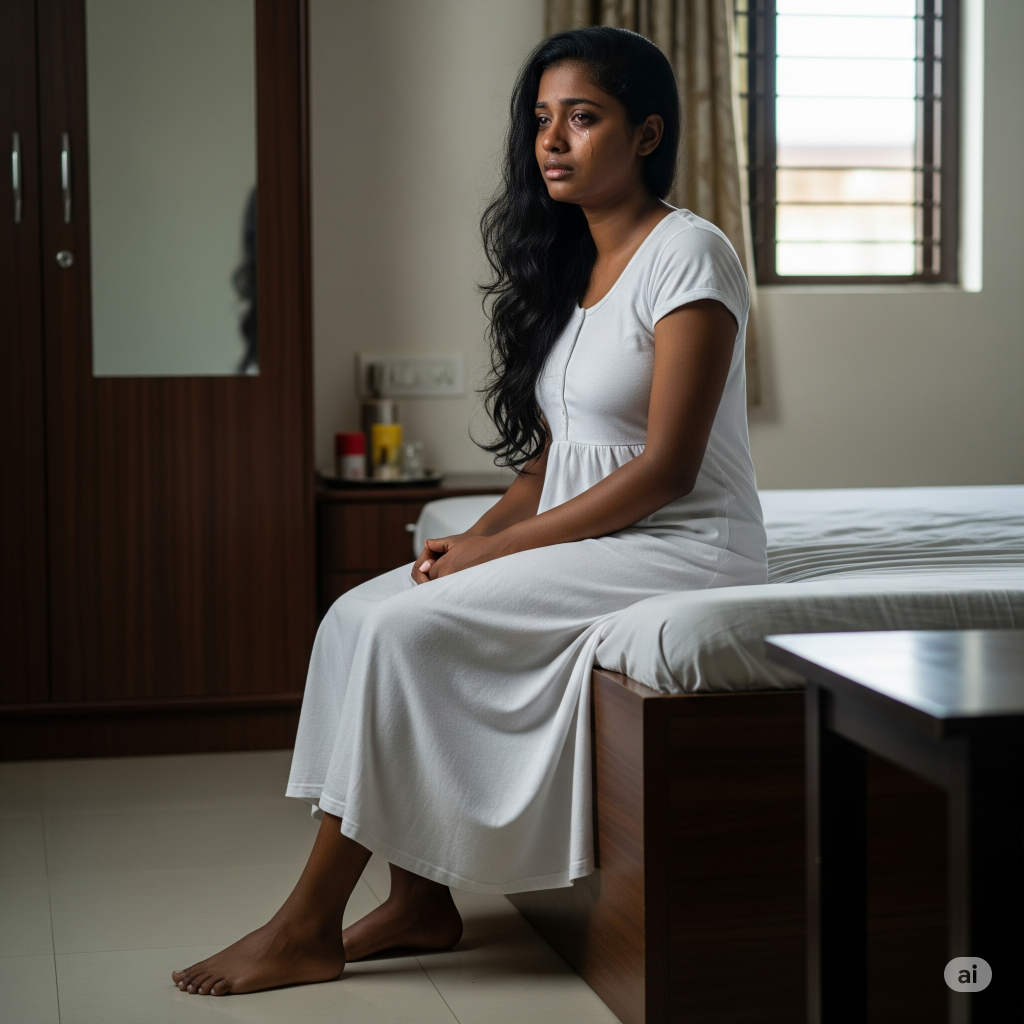
She’d once towered over her cousin. Now she was shorter than Rohini, and her limbs no longer obeyed the same way. Her strength had faded like a fever dream. She struggled now even to lift the big brass pot of water from the backyard tap. Her muscles had melted away, leaving softness in their place.
And emotions? They rolled over her in crashing waves. Things that never used to sting—now wounded her deeply. She felt too much, all the time. Her mother’s kind eyes. Her aunt’s exasperated sighs. Her cousin’s knowing glances. They each dug their way into her chest like thorns.
She found herself scribbling in the back of an old school notebook. She didn’t call it a diary, but it was one.
I hate this body. I hate what it wants. I hate that I touch myself and cry. I hate that I moan and then feel ashamed. I hate being called Nila. But I hate being Irulan too. I don’t know who I am anymore. Just that I’m tired.
She had tried yelling at her grandmother again, the last time they crossed paths. But Paati didn’t raise her voice. She simply said, “Twelve moons, child. Twelve chances. I only hope you learn before the final one.”
Nila had screamed, “You ruined my life!”
To which her grandmother had replied, “You ruined many others before I stepped in.”
And that… stung in ways she hadn’t expected.
She remembered how she used to speak to girls. The jokes. The grabbing. The careless cruelty. She had laughed with his friends while girls lowered their heads and walked faster. Now, when she passed boys at the bus stop, their eyes lingered on her hips, on the sway of her blouse, on the curve of her rear. It wasn’t flattering. It was terrifying.
And what frightened her even more… was that part of her liked being noticed.
Not by all. But Saravanan? When he looked at her, she burned. And she hated that too.
She pulled her shawl tighter over her chest and sank back onto the bed. Her body curled instinctively, thighs folded, arms pressing her breasts. The scent of coconut oil and talcum powder filled the air. She didn’t feel like Irulan. But she didn’t feel like Nila either.
She felt… lost.
Later that evening, her mother called from Chennai. The phone buzzed beside her, and when she answered, her mother’s voice was soft. “Kanna… are you okay?”
Nila bit her lip. “I don’t know, Amma.”
“You don’t have to be okay right now,” her mother whispered. “Just survive. Learn. Grow. You’re still my child.”
That broke her. Again.
And that night, she stood in front of the mirror in the hallway. Fully dressed in a dark blue saree Paati had chosen for her. Her eyes looked tired. Her lips full. Her chest proudly outlined in the blouse. She tried to stand tall, but the mirror stared back mercilessly.
I don’t know who that is.
She touched the glass. The girl inside looked scared.
Chapter 11 – Return to the Lion’s Den
The train to Chennai rattled through the night, but Nila barely slept. Her body, curved in places she still hadn’t made peace with, ached from the cramped seat. Her pink cotton churidhar clung to her thighs with sweat, and she kept adjusting her dupatta, trying to disappear.
When the train pulled into Egmore, she paused for a long time before stepping down. The scent of her old city—diesel, sweat, jasmine, and filtered coffee—hit her like a slap. She was home. But what was “home” now?
Her father greeted them at the station with a half-hearted nod, his eyes refusing to meet hers. Rohini had come too, glowing despite her third-trimester fatigue, and Nila stayed close to her cousin’s side, pretending not to notice the way her father’s mouth tightened every time she laughed.
At the house, her brother barely acknowledged her. He was too busy grinning, strutting around in new clothes and showing off the ring he’d bought for his fiancée. He made jokes about “how quiet the house had become lately,” and “how lucky he was to be getting a real woman.” The words stung.
Even during lunch, her chair was set a little apart. Her father didn’t ask her any questions. Her brother made sure she wasn’t part of the engagement arrangements. Only her mother looked at her with tenderness—serving her extra sambar, gently adjusting her bangles, rubbing oil into her hair before bed like when she was little.
“Appa and Anna…” Nila whispered that night, lying on the floor mattress beside her mother. “They look at me like I’m a ghost.”
Her mother brushed her cheek, voice trembling. “They don’t know what to make of your pain, kanmani. But that doesn’t mean it’s not real.”
The engagement ceremony was lavish—gold silk sarees, loud nadaswaram music, trays of kumkum and laddu. Nila wore a dull green saree, forced to tie her hair into a bun with malli flowers. She looked into the mirror before stepping out and hardly recognized herself: wide hips, curvy waist, eyes lined with kajal, the faint shadow of a bindi between her brows.
She stood in a corner, trying to blend into the background, when she saw him.
Saravanan.
Wearing a pale blue shirt that made his dusky skin glow, laughing with a group of boys near the entrance. His posture was easy, confident. Nila’s breath caught in her throat.
He turned—and saw her.
For a moment, their eyes locked. Confusion flitted across his face. Then realization. And something else—curiosity, recognition, even… warmth?
Later that evening, after the ceremony had ended and most of the guests had left, Nila found herself alone in the corridor near the back of the house. The jasmine in her hair had wilted, and she just needed air.
“Hey.”
She turned. It was Saravanan, holding two tumblers of coffee.
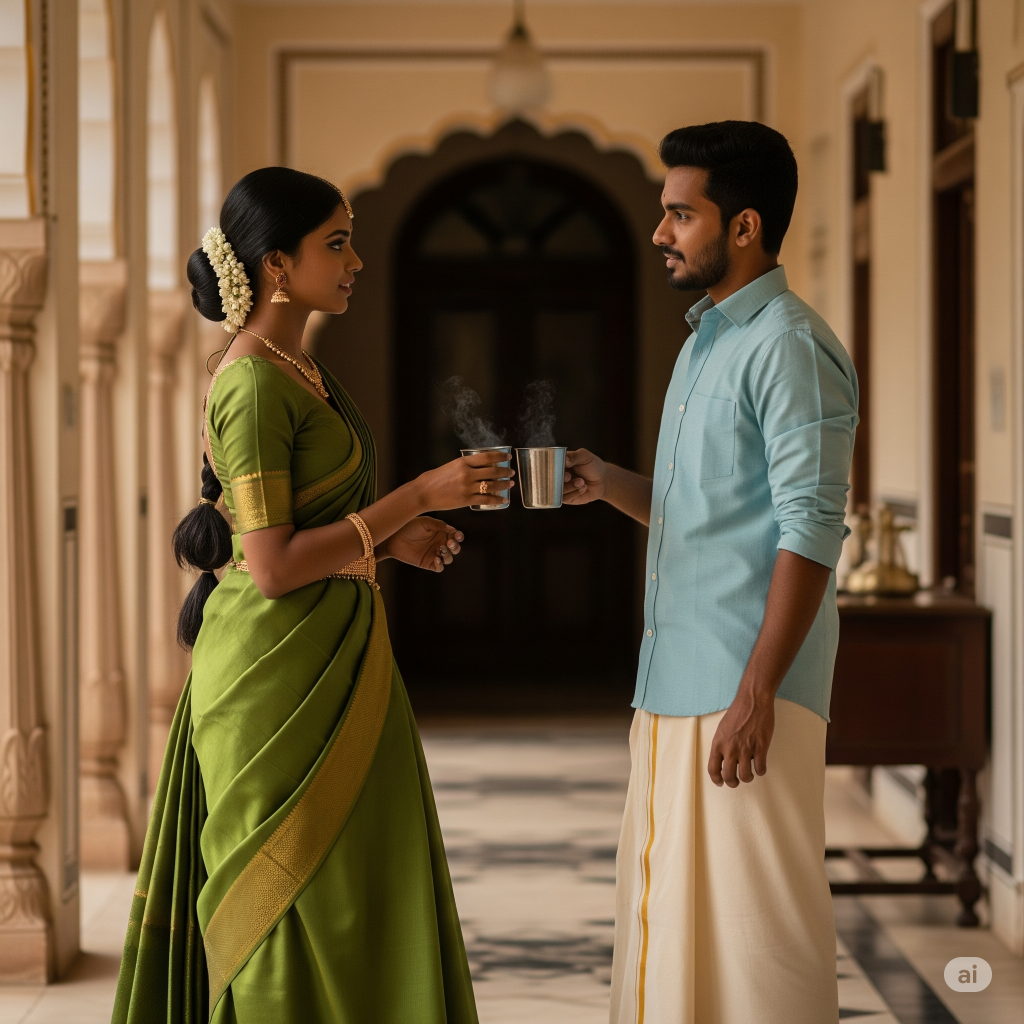
“I thought you could use one,” he said, handing it over. His eyes searched hers, uncertain. “You’re… Rohini’s cousin, right?”
Nila nodded, throat dry.
“I remember you. We played together when you visited your grandmother… when you were younger. But…” He tilted his head. “You look different.”
Her hand trembled. “People change.”
He stepped a little closer, his voice softer. “You changed beautifully.”
Nila took a step back. “Don’t.”
Saravanan blinked. “Sorry, I didn’t mean—”
“You don’t know me,” she snapped. “You don’t know what I’ve been through.”
He raised both hands in surrender. “Maybe. But I’d like to.”
The words sat between them, heavy and electric.
Nila stared at him, heart racing. A part of her wanted to scream, to run, to tell him everything—the curse, the hate, the fear. But another part—quieter, deeper—ached just to be seen like this.
A girl. A woman. Desirable. Human.
She turned away abruptly and walked down the corridor, the hot tears already spilling.
Behind her, Saravanan watched in silence, the untouched tumbler of coffee still in his hand.
Chapter 12 — The Stranger in the Mirror
Madurai was sweltering when Nila stepped off the bus. The city’s red dust clung to her sandals, the air thick with jasmine and diesel. Yet inside her, there was only cold—a quiet chill from the way her brother had looked through her in Chennai, like she was an unwelcome truth.
Back in the familiar old house, Nila dragged her suitcase into the room she now shared with Rohini. The moment she shut the door, her back slid against it. She crumpled to the floor, saree crinkling, the gold border shimmering faintly in the dusk. The tears came without a fight this time.
“Why did they look at me like that?” she whispered into the empty room. “Like I was nothing.”
That night, Rohini rubbed sesame oil into her swollen belly and motioned for Nila to come closer. “The baby’s kicking.” she said softly.
Nila hesitated, then sat beside her. Tentatively, she placed her palm on the firm curve of Rohini’s belly.
“There,” Rohini whispered.
Nila felt it—a sudden, gentle movement, like a flutter under water. Her eyes widened.
“That’s a foot, probably,” Rohini said, chuckling.
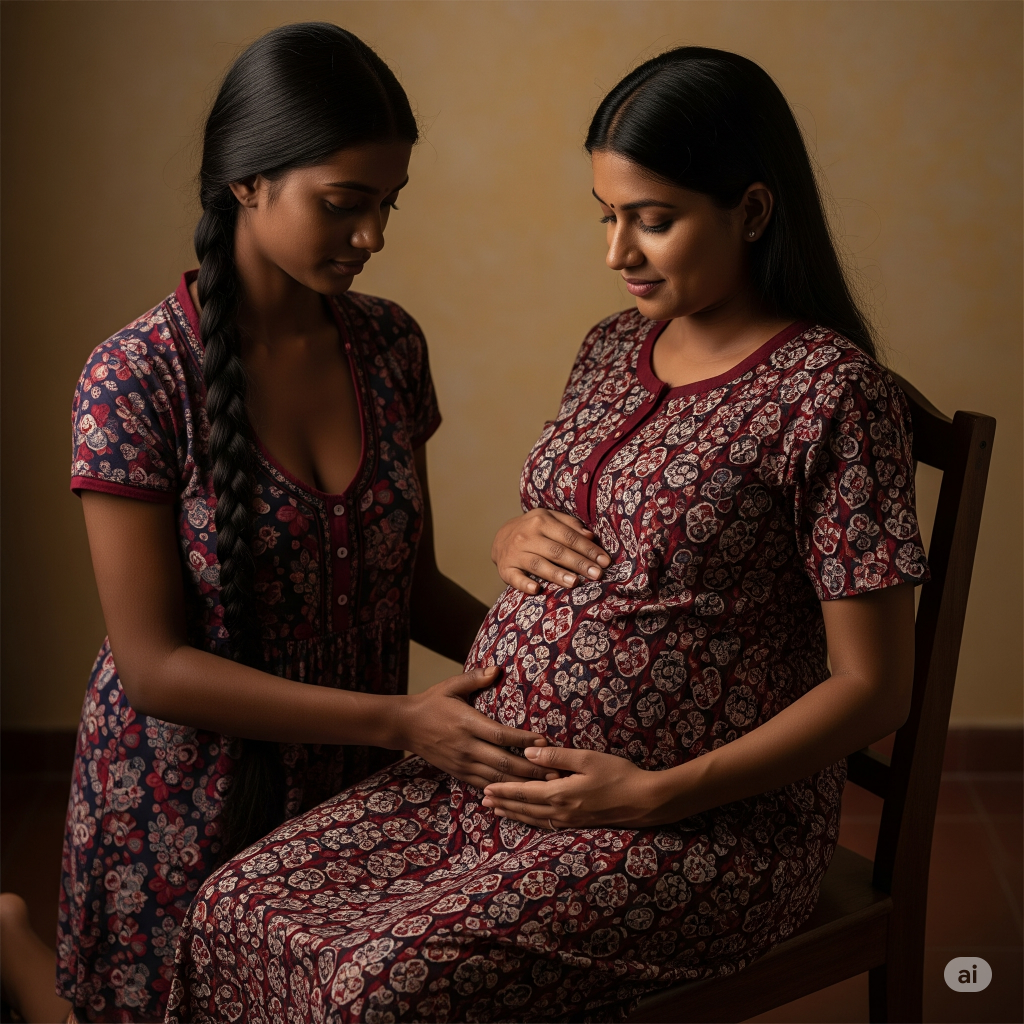
Nila’s throat tightened unexpectedly. That movement. That life. That spark from nothing. Her body shivered—not from disgust, but from awe. The warmth of it stayed in her palm, like some ancient truth had been pressed into her skin.
“Does it feel strange?” Rohini asked.
Nila nodded slowly. “It… it feels like magic.”
They sat in silence for a long moment. Nila’s hand still on her cousin’s belly. She thought of her own body. Her curved hips. Her soft breasts. The menstrual blood. And now, this—this terrifying, breathtaking possibility of creating life.
She pulled her hand back, suddenly overcome.
“I’m sorry,” she murmured.
“Don’t be,” Rohini said. “You felt it. That’s enough.”
That night, on the train to Chennai, Nila sat by the window and stared into the dark, her hands resting on her lap. She wasn’t ready for motherhood. She wasn’t even ready for herself.
But somewhere in that flutter beneath her cousin’s skin, something had changed.
Over the next few days, Nila moved like a ghost through the house. The stares from Chennai wouldn’t leave her mind. Her father’s dismissive voice. Her brother’s forced smile. The way they looked at her like she was embarrassing—like femininity was a downgrade.
But worst of all was how easily her mother’s gentle presence had been overshadowed.
Why did being a woman mean being second?
She began noticing it everywhere: how her grandmother’s voice always lowered when her father called. How her aunt was expected to manage meals, laundry, and conversation all at once without a word of thanks. Even Rohini, pregnant and aching, still bent over to fold clothes when no one asked her to.
And Nila, who had once commanded the world with careless confidence, was now expected to speak softly, walk gracefully, dress modestly, and disappear when the men came home.
She found herself talking to her reflection again.
“You wanted me to learn,” she muttered one night, staring at the girl with tear-glossed lips in the mirror. “But did you ever wonder what I’d become?”
Chapter 13 — The Kiss Beneath the Rain Tree
But now, in the stillness of her grandmother’s house, she felt frayed. Every mirror she passed mocked her; the woman she had become was no longer a costume. It was her life. Her body. Her fate.
And somewhere in that swirl of identity and ache was Saravanan.
She hadn’t expected to see him at the engagement. Hadn’t expected that slight smile, the quiet “Hi Nila” when they crossed paths near the sweet stall. Hadn’t expected her stomach to turn the way it did. The truth was unbearable—part of her had wanted to see him.
A few evenings later, she wandered toward the small grove behind the compound wall, under the pretense of gathering hibiscus flowers for her grandmother’s pujai. But the air smelled like approaching rain, and her mind buzzed with a thousand unnamed feelings.
And then she saw him.
Saravanan stood by the rain tree, leaning against its trunk with a kind of nervous calm, as if he had been waiting. His shirt was a little damp, collar open, sleeves rolled.
“You came back,” he said softly.
“I live here,” she replied, trying not to sound shaken.
He smiled, stepping closer. “I mean… after the engagement. I wasn’t sure if you’d want to see me.”
She scoffed lightly. “Didn’t think you cared.”
There was silence, the heavy kind that dripped with unsaid things. Then:
“I’ve been thinking about you. A lot,” Saravanan said, voice low. “It’s confusing. I know your past. But… now… the way you walk, talk, look at me…”
Nila turned away, a bitter laugh escaping her lips. “You think this is easy for me? I didn’t ask for this body. This life. I was cursed. And now I have to—”
She choked on her words, the anger collapsing into a sob. Saravanan moved closer but didn’t touch her yet. He just stood there, quietly present.
“I hate this body,” she whispered. “I hate how soft I’ve become. How people look at me. How my chest moves when I walk. How I cry like this…”
“And yet,” he said gently, “you’re still you. Just… different.”
She finally turned, meeting his eyes—eyes that didn’t flinch or pity her, just saw her.
“Why are you here?” she asked.
“Because I think you need someone to see you. Really see you.”
A wind blew, carrying the scent of jasmine and rain. She felt her breath catch. His hand reached for hers—warm, calloused, real.
And in the space between breath and silence, their lips met.
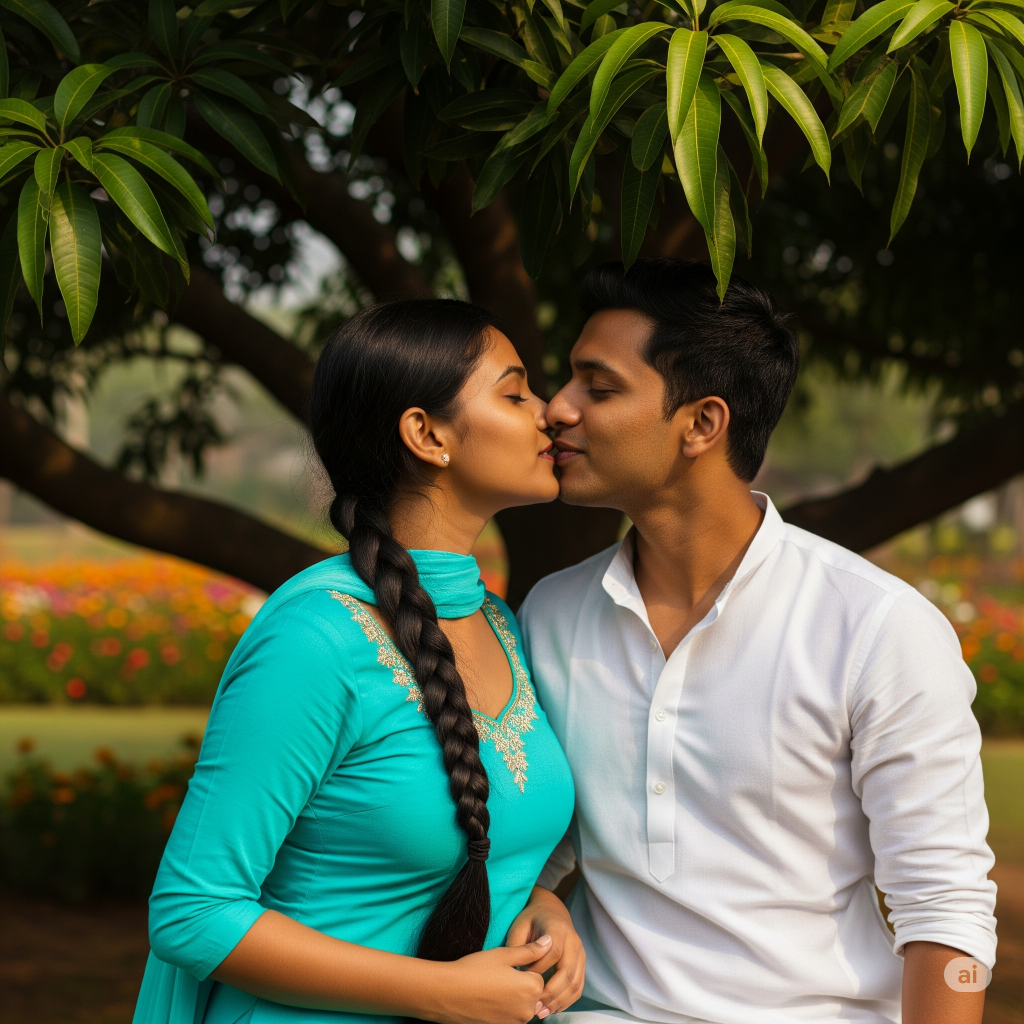
It wasn’t fierce, but it was deep. Tender. A surrender.
Nila didn’t expect to feel the way she did—her skin buzzed, her spine tingled. Her breasts pressed against his chest, and she felt exposed, vulnerable, but also… wanted. The kiss wasn’t just physical—it was a mirror. It showed her everything she had become, everything she feared, and everything she craved.
When they finally pulled apart, her chest rose and fell like waves.
Saravanan brushed a strand of hair from her face. “I don’t care what you were. I care about who you are now.”
She didn’t reply. Couldn’t. Her heart beat too fast.
But for the first time in weeks, her tears weren’t from grief. They were from something far more dangerous—hope.
Chapter 14: The Choice
Nila didn’t expect the words of a stranger to set her world ablaze.
The community hall in Madurai was packed. Women of all ages sat on plastic chairs fanning themselves, the air heavy with jasmine and sweat. On the dais stood Dr. Vennila, a renowned feminist scholar from Chennai. Her voice cut through the humidity like a blade.
“They told us to stay quiet. That our value lies in our obedience. But our voices are ancient. We are not shadows of men. We are the fire they fear.”
Nila sat in the back row, a borrowed cotton dupatta wrapped around her shoulders. At first, she listened out of curiosity. Then something began to shift.
Each word carved into her, like chisel to stone. Dr. Vennila spoke of patriarchy—not as a distant force, but a familiar enemy. A father who silenced. A brother who mocked. A husband who controlled. And Nila, for the first time, saw herself in both the oppressed… and the oppressor.
She had been that boy once. That boy who laughed when girls cried, who dismissed their discomfort, who walked ahead on the street expecting them to follow.
Tears welled in her eyes before she could stop them. She wasn’t even sure why she was crying—shame? Recognition? Release?
She left the hall changed. Not because someone had told her who to be, but because someone had reminded her what she was capable of.
Rohini’s water broke at dawn the next day.
There was no time to panic. The midwife was already on her way, and Nila sprang into action. She’d seen videos online, read bits from leaflets in the waiting room—but nothing prepared her for the sounds, the smells, the staggering rawness of birth.
Rohini’s screams tore through the small bedroom. Her mother held her hand. The midwife barked instructions. And Nila stood near the foot of the bed, trembling.
She wasn’t horrified.
She was in awe.
Watching Rohini labor, seeing her body do something so primal and sacred, Nila felt like she was in the presence of goddesses. When the baby’s head crowned and then slipped into the midwife’s hands, red and wrinkled and screaming, Nila let out a sob she hadn’t meant to.
She reached out and touched the baby’s wet cheek.
Later, when Rohini’s blouse was undone and the child found her breast on instinct, Nila turned away, overwhelmed. She wasn’t disgusted. She was yearning.
When they placed the baby in her arms, she stared at the tiny fists, the fluttering lashes, the soft, milk-scented skin.
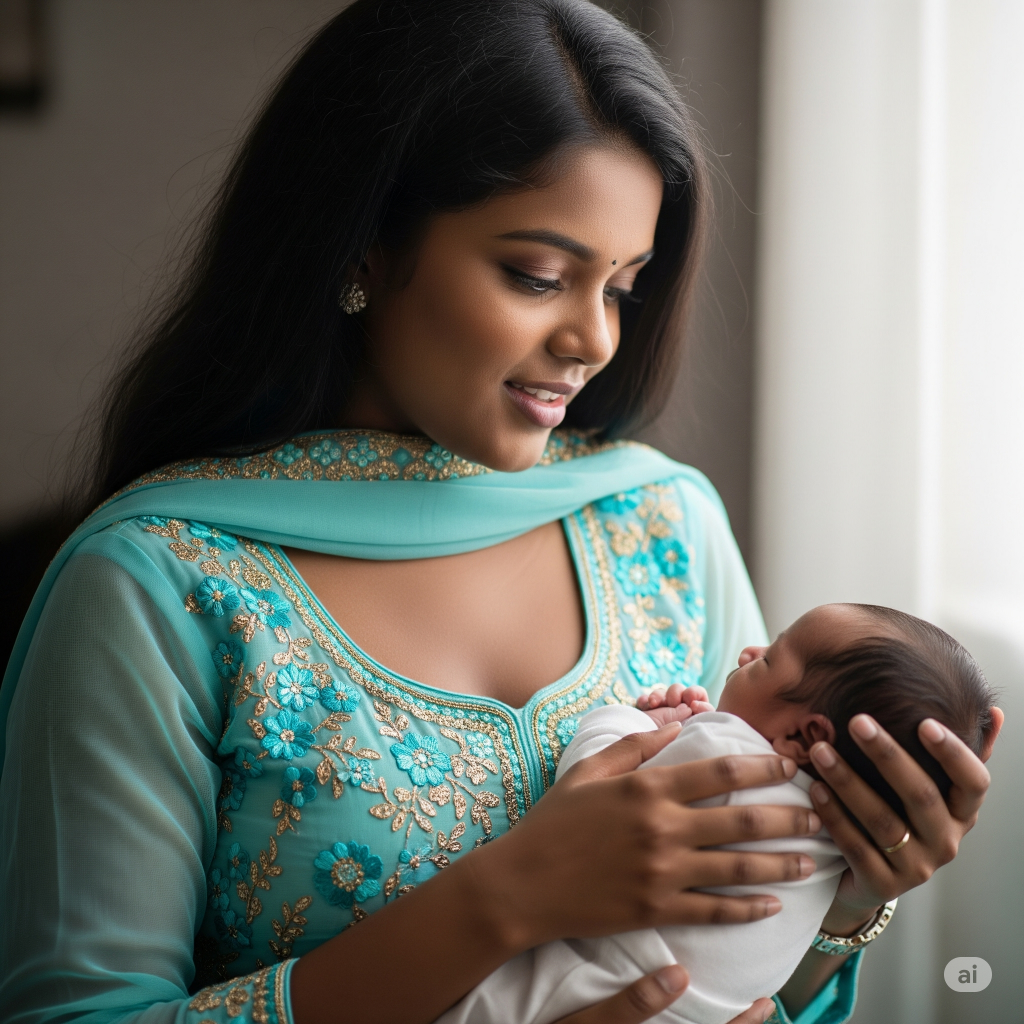
“I want this,” she whispered.
She hadn’t meant to say it aloud. But Rohini heard.
“You do?” Rohini asked gently, her voice still weak from labor.
Nila nodded.
“I want to stay this way,” she said. “I want to be… not just a woman. But this kind of woman. The kind who creates. Who loves. Who nurtures.”
Rohini’s eyes brimmed with tears. “Then you know what that means.”
Only two menstrual cycles remained.
After the twelfth, if she had not conceived, the curse would lift. Her male body would return. And with it, the weight of who she used to be.
Nila couldn’t bear that thought. Her identity was no longer a disguise. It was her truth.
But truth came with choices.
One afternoon, in the quiet garden behind the house, she found Saravanan.
He had been helping her grandmother mend an old swing. His shirt was off. His skin glistened in the sun. He looked up when she approached, his eyes lingering on her differently now. There was confusion in them. But there was desire too.
Nila’s voice trembled.
“I need to talk to you.”
Saravanan nodded, tossing his tools aside. “Go ahead.”
“I need your help,” she said, looking into his eyes. “To stay who I am.”
He furrowed his brow. “What do you mean?”
Nila stepped closer. “I don’t have much time. The curse will end soon. I’ll become… someone else again. Unless I get pregnant.”
Saravanan’s eyes widened. The weight of her words landed slowly.
“You want me to—?”
“I trust you,” she interrupted. “And I… care about you. This isn’t about a favor. It’s a choice. One I can’t make without you.”
The air between them stilled. Birds chirped. The leaves rustled. And Saravanan reached out, brushing a strand of hair behind her ear.
“I don’t understand everything about what’s happened to you,” he said softly. “But I know who you are now. And I’d be honored.”
Nila exhaled, her whole body trembling—not from fear, but from the quiet joy of being seen.
Chapter 15: Moonlit Surrender
The day of the full moon came with an eerie quietness, as if the very air around Nila could sense the weight of what was to come. She had been counting down—two menstrual cycles left, two chances to escape the ticking curse that threatened to pull her back into the life she no longer recognized as her own. But now, everything had changed. She didn’t want to escape. She wanted to remain.
The feminist speech had opened something inside her—like a floodgate bursting, releasing a lifetime of guilt, shame, and the blinding privilege she had once worn like armor. Now she saw herself clearly—not just as Nila, but as someone who had lived blind to the pain and power of womanhood. She wanted to stay, to live this truth, to fight for it. And to do that, she had to embrace everything that came with it. Even motherhood.
Rohini’s childbirth had left her breathless. She’d watched her cousin’s body rise and twist and push life into the world. And then the baby’s first cry, the sight of Rohini holding her child to her chest and nursing—something cracked open in Nila’s heart. She had touched the baby’s soft skin, held her in trembling arms, and felt a quiet fire spark inside her.
“I want this,” she whispered later that night, looking up at the moon through the window.
And so, she went to him.
Saravanan had just stepped out onto the veranda of his house when she arrived. The silver light of the moon poured down on her, catching the soft folds of the saree she had so carefully draped. Her hair was tied back in a long, loose braid, her bangles quietly tinkling as she stepped closer.
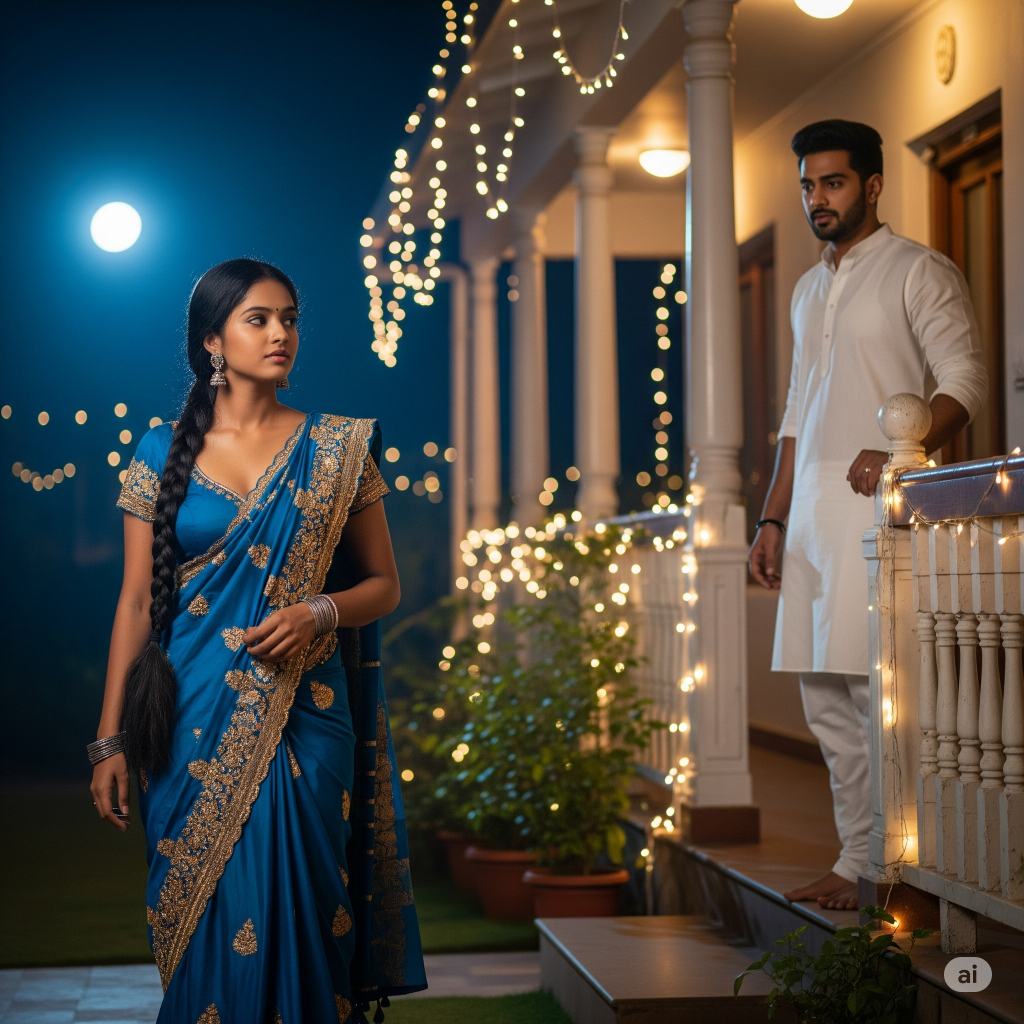
“Nila…” he said, a mixture of surprise and tenderness in his voice.
She didn’t let him finish.
“I want you,” she said simply. Her voice trembled. “Not just for tonight… but I want to create something… to remain like this. I don’t want to go back.”
His eyes searched hers, gently, uncertainly. “Are you sure?”
She nodded. “Yes. I’ve never been more sure of anything.”
He took her hand, and led her inside.
In the quiet glow of candlelight and moonlight, they stood facing one another. Nila felt nervous—ashamed of her trembling hands, her pounding heart, the softness of her body. But Saravanan didn’t rush her. He touched her like she was something sacred. Her blouse slipped off, and her breasts were bared to his warm gaze. She still felt self-conscious, but his lips kissed away the hesitation.
When he finally entered her, slow and tender, her body arched in surrender. The sensation was new, deep, intense—at first strange, then consuming. A mix of pain, pleasure, and wonder rolled through her, cresting like a wave. Her legs wrapped around his waist instinctively. She cried out—part surprise, part release.
Their bodies moved together like a rhythm older than language. His lips were on her neck, his hands anchoring her hips, her moans soft, drawn from someplace that once never existed. When she reached climax, it was with tears streaming down her cheeks.
Tears of fear. Tears of joy. Tears of finality.
Afterward, they lay together, breathless. Her head was against his chest, listening to the steady beat of his heart.
“Are you okay?” he whispered.
She nodded. “I think I’m finally who I was meant to be.”
Outside, the full moon shone bright. And deep within her, life had begun.
Chapter 16: The Seed Within
The morning after the full moon felt like the calm after a storm. Nila lay in bed, the light filtering through the half-closed window, brushing across the curves of her bare shoulder. Her hand lingered on her belly — flat still, but suddenly sacred. Something had changed. Not just what had happened between her and Saravanan, but what it meant.
She couldn’t explain it — the way her body felt subtly different, heavier in her chest, warmer in her hips, as though her very cells were rearranging themselves in preparation. A tremble ran through her as she pulled the blanket tighter, not from cold, but from knowing.
Her body, once alien to her, now felt like a vessel. A container of possibility.
The First Signs
The nausea hit first. It came in gentle waves in the mornings, making her recoil from the smell of coffee and idli batter. She didn’t say anything at first. Rohini noticed before anyone else.
“You okay?” Rohini asked one morning as Nila pressed a hand to her stomach.
“I’m fine,” she lied, even as her mouth filled with a bitter taste. But Rohini gave her a long look, then silently handed her a slice of lime.
Nila sucked on it and nodded. “Thanks.”
Later that evening, Rohini pulled her aside and said gently, “Is it what I think it is?”
Nila looked away. Her fingers trembled. “I think so.”
Rohini smiled. A soft, maternal smile. “Then congratulations. You did it.”
Those words made Nila exhale shakily. It was real now.
Family Reactions
Her grandmother was the first to notice the change in Nila’s face. There was a new glow — faint, but unmistakable. “You look different,” she said, narrowing her eyes.
Her aunt remained silent, but observant. It was Nila’s mother who broke the news — gently, firmly, before the old woman could utter a spell or speak a curse.
“She made her choice,” her mother said, holding Nila’s hand in front of the family. “And she will live it proudly.”
The grandmother’s jaw tightened. But she saw it in Nila’s face too — a fierce peace. “So be it,” the old woman muttered. “No spell can unwind a womb once it’s filled.”
It was both surrender and blessing.
Saravanan’s Reaction
When Nila told Saravanan under the neem tree, his reaction stunned her. He didn’t ask if she was sure. He didn’t panic or step back.
He simply knelt down and touched her belly.
“Then this is sacred,” he whispered. “You’ve chosen your truth.”
Nila’s throat tightened. “A truth I never imagined wanting.”
“But now?” he asked.
She closed her eyes. “Now… I can’t imagine turning back.”
A New Beginning
Later that night, as she lay in bed, the reality of it all washed over her — the baby, the body, the irreversible path. A single tear slid down her cheek, but it wasn’t sorrow. It was awe.
Her hands cradled her belly again.
This body she once hated — it was no longer a punishment. It was her path. Her truth.
And inside her, the seed of her future stirred.
Epilogue: Nila, at Dawn
The scent of jasmine filled the small courtyard as dawn bathed the stone steps in gold. Nila sat on the veranda in a soft cotton saree, one hand absentmindedly stroking her swollen belly, the other holding a half-finished glass of milk. Her face glowed — not just with the radiance of impending motherhood, but with a peace she had once thought was forever out of reach.
Madurai had woken early around her. The temple bells had rung; the street hawkers had begun calling out their wares. But inside the small ancestral home, there was only stillness and the gentle rhythm of new life.
She had chosen this life. Not out of surrender, but out of strength.
There were nights she still wept — for her past, for the boy she once was, for the pain that had shaped her. But they were quieter tears now. No longer filled with rage or confusion. Only memory. Only tenderness.
She ran her fingers over the stretch marks beginning to appear under her blouse and smiled.
She had learned to wear her bras, to tie sarees, to move with a grace that no longer felt foreign. Her reflection in the mirror no longer startled her. It welcomed her.
Saravanan stepped outside quietly behind her. He had become her partner in quiet ways — not with grand declarations, but with the way he rubbed her feet at night, or held her when nausea overtook her, or kissed the crown of her head after a long day.
He placed a warm hand on her belly. “She kicked again?”
Nila nodded. “Stronger than yesterday.”
He kissed her cheek. “Just like her mother.”
A gentle laugh escaped her lips. And with it, a weight lifted.
In the distance, the temple gopuram gleamed in the morning sun. Once, she had gone there begging for answers. Now, she didn’t need them. The curse had not broken her. It had unwrapped her — layer by layer — until her truest self stood in the open.
She wasn’t Irulan anymore.
She was Nila.
Mother. Woman. Warrior.
And in her womb, the next chapter waited to be born.
